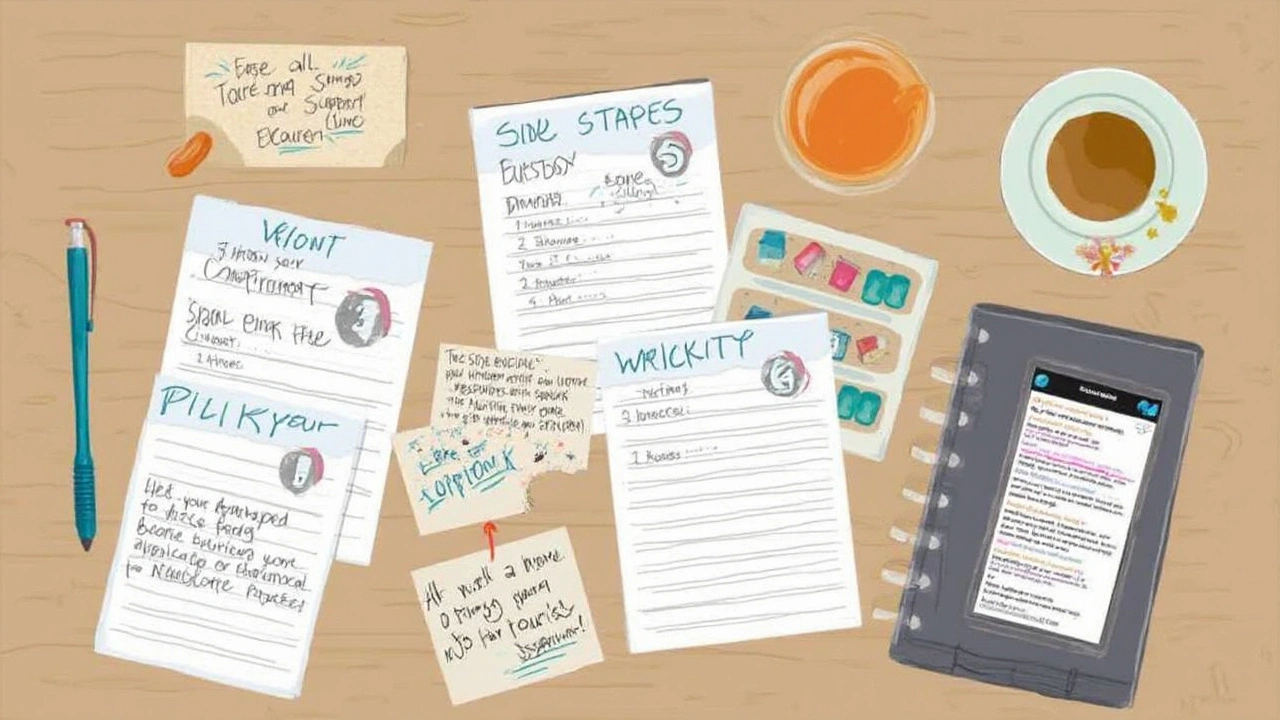If you’ve ever laid awake at 3am, thoughts racing, feeling like your brain’s stuck on full volume, you know the gnawing grip anxiety or depression can have. Effexor, also called venlafaxine, is a familiar name in many doctor’s offices and pharmacy counters. It’s helped millions of folks worldwide find their footing when emotions felt too heavy or fuzzy. But what exactly is this little capsule? How does it work, and what’s it like living with it day to day? Turns out, there’s a lot to unpack about this medication that’s shaped so many lives—including people close to me, and maybe even you.
Understanding Effexor: What It Is and How It Works
Effexor, or venlafaxine, is a type of antidepressant called an SNRI: serotonin-norepinephrine reuptake inhibitor. Unlike older antidepressants, which often had more gnarly side effects, SNRIs like Effexor target two key brain chemicals—serotonin and norepinephrine. These chemicals are kind of the "feel good" and "fight or flight" messengers in your brain, and when they’re off balance, you might feel down or wired in a not-so-fun way. Effexor helps by blocking the little valves that suck up these messengers, keeping more of them hanging around to balance out your brain. It’s prescribed for depression, but doctors also lean on it for general anxiety disorder (GAD), social anxiety, and panic disorder. Some people even get it for certain pain syndromes, like nerve pain or fibromyalgia, though that’s not its main job.
The usual starting dose sits around 37.5mg to 75mg a day, but your doctor might tweak this based on how things are going. Dose can also go up slowly to about 225mg for serious cases. Effexor comes in regular and extended-release versions (those little capsules that let you only take it once a day, so less hassle remembering). If you’re switching from another antidepressant, your doctor’s likely to create a tapering plan, because suddenly swapping these meds can mess with your head—literally.
If you or someone in your family has a history of mood disorders, the word “Effexor” probably makes you think of one question: does it actually work? Loads of clinical trials back it up. In big studies, about 50-60% of folks with depression got a big improvement after about eight weeks on Effexor—better than what’s seen with just placebo (think, sugar pill), and comparable to other SNRIs like Cymbalta. For anxiety, the numbers look alike. Not everyone responds the same—some feel a lift within days, while others need a solid month or more before the fog lifts. There's no universal timeline since brains really do march to their own drum.
If you look at how it fits in with day-to-day life, Effexor is one of the most prescribed antidepressants in Australia and the US. Doctors tend to favor it if someone’s tried SSRIs (the classic first step for depression) and just didn’t get relief, or if those meds caused too many sexual or stomach side effects. It’s the go-to for people who cycle quickly from low to anxious, because it covers both. But, if you have a heart history or blood pressure issues, doctors will eye you closely—Effexor can sometimes make blood pressure tick upwards, especially on higher doses. Regular checks are pretty much mandatory and, trust me, skipping on those follow-ups is not a good idea.
One thing to know: Effexor is not a “happy pill.” You don’t suddenly get a wave of joy or buzz. What most users report is that the sharp points of their mood start to even out, and the hopeless grey gets a bit less heavy. You may also find your sleep and appetite start to look more normal. As for taking it, Effexor likes routine—taking it at the exact same time each day, usually with food, helps avoid nausea, which can be brutal if you take it on an empty stomach.
Now, Effexor isn’t magic, and it shouldn’t be the only tool in your kit. Most psychiatrists team it with talk therapy, lifestyle changes, or sometimes other meds. It won’t make stress vanish, but it can give you the emotional bandwidth to actually face daily stuff, go for walks, or just get out of bed. Those “little wins” become more possible. My cat, Tom, definitely benefits when I have a bit more pep to play with him and don’t just burrow under the doona when life feels loud.

Effexor Side Effects, Real-World Experiences, and Tapering Off
Everyone wants to know about side effects—and there’s good reason. Effexor carries a bit of a reputation. The most common culprit? Nausea and a jittery gut, especially when just starting up or after bumping your dose. I’ve heard loads of stories from friends who, for the first week, made the bathroom their office. For most, this chills out after a few days, especially if you put something in your stomach first. Other usual suspects: dry mouth, sweaty palms (some call it the ‘Effexor Sweats’), loss of appetite, or insomnia. Less often, headaches, dizziness, or weird dreams—seriously, the kind that make you think your brain’s streaming some twisted Netflix original. If you bump into sudden vision changes or eye pain, talk to your doc right away—rare, but possible.
There’s an awkward side too: sexual side effects. Some men notice less interest or delayed orgasm, and women sometimes find it tougher to reach climax. It helps to actually talk to your doctor if this bugs you—they’ve heard it all. Switching the time you take Effexor, or adding meds that counteract these effects, can work.
Effexor and blood pressure is a thing. At higher doses, some folks notice their BP rising, so your GP will usually ask for a quick reading at each check-in. If you already deal with high BP, make sure to raise that at your appointment. Rarely, Effexor can mess with heart rhythms; if you spot palpitations or feel faint, don’t brush it off.
Withdrawal is another beast. Effexor has a shorter half-life than many antidepressants, meaning it leaves your system faster—and your brain really feels it. People talk about “brain zaps” (that’s a real term patients use—a kind of electric shock sensation in your head), dizziness, or sudden mood swings if you miss a dose by as little as 12 hours. If you’re coming off Effexor, take it slow. Doctors usually recommend shaving off just a bit every week. Some even open the capsules, counting out beads (ask your pharmacist—don’t DIY!). If things get rough, don’t try to tough it out alone. Withdrawal’s not a sign you’re “addicted”—just that your brain adapted to having the extra serotonin and norepinephrine around. Waiting it out can be miserable; steep drops can hit like a sledgehammer, especially if you have a history of panic or mood swings. Keeping a symptom diary as you reduce can help your doctor tweak the pace and spot rebound anxiety or depression early, so you avoid crashing.
One thing lots of seasoned users recommend: consistency. Try setting an alarm on your phone so you don’t miss a dose. If you do, and it’s only been a few hours, take it as soon as you remember. If it’s almost time for the next dose, just skip; don’t double up. Missing two or more doses in a row is where things can get wobbly. Changes in sleep, appetite, or weird dreams? Could be withdrawal or the depression/anxiety peeking back in.
Not everyone has a terrible time, though. Plenty find their “sweet spot” quickly, and after the first month, side effects fade off or vanish. Some discover real joy again: finally crying only at sad movies instead of at breakfast, or waking up for work and not dreading the day by default. Others, though, never quite mesh with Effexor’s side effect profile, and move on to something else. That’s normal. Most psychiatrists say it takes a few different tries—sometimes three or even four medications—before someone lands on their perfect match. There’s no shame in swapping if it isn’t working for you.
What’s wild is that Effexor is used by all sorts of people—university students, parents, high-pressure execs. Kids under 18 generally don’t get it unless guided super closely, because the side effect risks are higher. For older adults, doctors start low and go slow, to avoid blood pressure or heart side effects.
When it comes to mixing with everyday life, you can drive, work, or just hang with friends while on Effexor, though the first week or two might leave you a bit foggy. It’s smart to avoid booze or cutting caffeine in for a while—alcohol can amplify drowsiness or mood changes; caffeine sometimes bumps anxiety or stomach jitters.
If you have a pet (like my cat Tom, who seems to know when I’m stressed), you’ll notice your own moods affect theirs. That can be a strange motivator to keep your meds game sharp. Even small stability goes a long way in daily routines for us—and for our animal buddies, who’re often better than any therapist at spotting bad days.

Practical Tips for Life With Effexor
Daily life on Effexor takes a bit of learning, but most people work out their own hacks over time. One major tip—never stop Effexor suddenly, unless your doctor tells you. Tapering takes patience; jumping off invites withdrawal nightmares. If you’re planning travel, bring extra doses plus a doctor’s note—airports don’t mess around, and losing your supply even for a day can send your brain reeling.
Taking Effexor with food is a game-changer for stomach issues. Something as simple as buttered toast in the morning works for most. Some people find splitting doses with their doctor’s approval can even out side effects, especially for that initial “jitters” feeling. Extended-release capsules make routines easier, though a few folks notice more insomnia with XR versus IR (immediate-release) forms.
Hydration helps—a lot. Effexor can dry your mouth, so keep a water bottle handy. Sugar-free gum works if dry mouth bugs you all day. Sleep hygiene is huge too: no screens in bed, keep late showers cool, and wind down with an actual book. If insomnia keeps biting, talk to your doc—sometimes, switching dose timing (morning instead of bedtime) solves that.
If you track your mood (apps, journals, or even a chart on the fridge), you’ll spot slow shifts. These are often tiny wins—less panicky mornings, more laughter at TV shows, the sudden energy to tackle laundry. Write them down—you’ll forget how far you’ve come otherwise. Some people share these wins on forums; others just celebrate with family or pets (again, my Tom gets extra treats on my “good days”).
People sometimes wonder about mixing Effexor with other treatments. Therapy pairs well, especially cognitive-behavioral techniques. Regular exercise—even just the sort of casual walks you’d take to clear your head—actually boosts the brain’s happy chemicals, stacking the odds in your favor. Avoid street drugs; combining anything with Effexor can mess with your serotonin and lead to dangerous stuff like serotonin syndrome (think: confusion, fever, shaking). If you notice sudden agitation, sweating, or confusion, it’s doctor time—stat.
Be honest with yourself: Effexor isn’t about turning you into a robot. If you feel “flat” or emotionally numb, check in with your healthcare team. Sometimes a dose tweak can help. If motivation tanks, or you notice no effect after six weeks, don’t give in to frustration—the right fit might still be around the corner.
A lot of people stress about long-term use: “Am I stuck on this forever?” Not always. For first-timers, psychiatrists usually aim for at least 6-12 months free from big symptoms before considering a slow taper. Some need longer, especially if depression/anxiety keeps coming back. Others use Effexor as a rescue for rough patches, then switch off with professional guidance.
If you’re supporting someone on Effexor, patience is everything. Don’t pester for updates, but let them know you see their efforts. Keep an eye out for sudden dips or rough withdrawals, and know it’s not just “in their head.” Small encouragement—texts, coffee invites, even sharing memes—go a long way.
For Aussies, getting Effexor prescribed means regular GP or psych visits, quick blood pressure checks, and picking up scripts at the pharmacy. Costs can vary, but the generic version (venlafaxine) often saves a few bucks. Repeat scripts? Set reminders so you never run out—pharmacies sometimes need a day’s notice to restock.
And don’t brush off side symptoms, even odd ones. A sudden strange rash, odd swelling, or weird new thoughts deserve a check-in with your doctor or pharmacist. Most side effects fade by week four, but lingering ones can often be solved with a quick tweak or switching brands.
You don’t have to muddle through alone. Millions are on the same journey—anxious, hopeful, skeptical, or all three. Whether you’re climbing out of a dark patch or just trying to keep your feet steady beneath you, Effexor is a powerful tool, but it’s not the whole answer. Stack it with good company, honest conversations, and a bit of grace for yourself. Even a grumpy old cat like Tom knows: everyone deserves a little help carrying the weight.


Post A Comment